What words you can find from CUCUMBER PLANT? ‘I know! I know! words like P-u-t Put, A-n-t Ant, U-p Up’, so on. But you know I got some very interesting words from the students which I would have not thought of, the words like camel, bear, pear, even Amruta a girl’s name from Smt. Sunandabai Bandodkar High School, Paetona. The students from Kasturba Matoshri High School(KMS),Panjim gave me similar type of words, but Mae dos Pobres Primary School, Nuvem students surprised me with their words like numbers, tear, parent, uncle, plate , camel, crib, late, lamp, place, lamb, etc.
After our word building game we moved to pre story discussion. We discussed the ‘donkey’. This was to know what students know about donkey across the schools I found that most of the students know that donkeys are used to carry the loads, weight like wood and clothes etc.
Why do we domesticate the donkeys? Because they are strong, intelligent and they listen to you. Then I asked them whether they use the word donkey in their daily life, in KMS one boy said “Gadda Kahinka”, then went into deeper discussion, I asked them ‘if the donkey is intelligent and strong, why do we call people donkey’ they could not answer it.
With no answer coming in for that point I moved to the Read Aloud part of our session, the students were very quiet as we began to read the story. They were enjoying the story and were giggling, when the donkey started singing and did not want to stop. Throughout the Read Aloud, I was asking them questions including what the cucumbers would do when the donkey didn’t stop singing? The students replied that the cucumbers will close their ears, fall from the plant, dry up, one cucumber will put another cucumber in his mouth and then he will keep quiet.
They were surprised to see the cucumbers walk to the farmer’s house. To get them more engaged and deeper involved in the story, I asked them why the farmer didn’t come when the donkey was singing? And they responded; as it was night, he may have been sleeping, he may have been dreaming about the cucumbers (to sopneita dista tache tovshanche).
They were so glad that he was really dreaming about the cucumbers.
Oh!!!! Oh No!! now what the farmer will do with so many cucumbers? And you know what the students said: ‘He will give the cucumbers to his neighbours for free!’
‘He will sell the cucumbers in the market and with that money he will plant the carrots instead!’
‘He will eat the cucumbers.’
‘He will feed the donkey with more cucumbers and the donkey will die.’
‘He will domesticate the donkey for himself and sell the donkey in the market and the donkey will run away.’
‘He will be happy because his dream became true.’
he will take some people from the village and shoo the donkey away and
‘He will be happy because he will not have to work in the field.’
What will the donkey do after he sees that there are no cucumbers in the field:
‘The donkey will die by eating so many cucumbers.’
‘The donkey will keep sleeping in the field.’
‘The donkey will be sad, he will cry.’
‘The donkey will go back to the washerman!’
As this story is a folktale, one boy had heard a similar story but in that story at the end the farmer comes with people and shooed the donkey away from his field.
